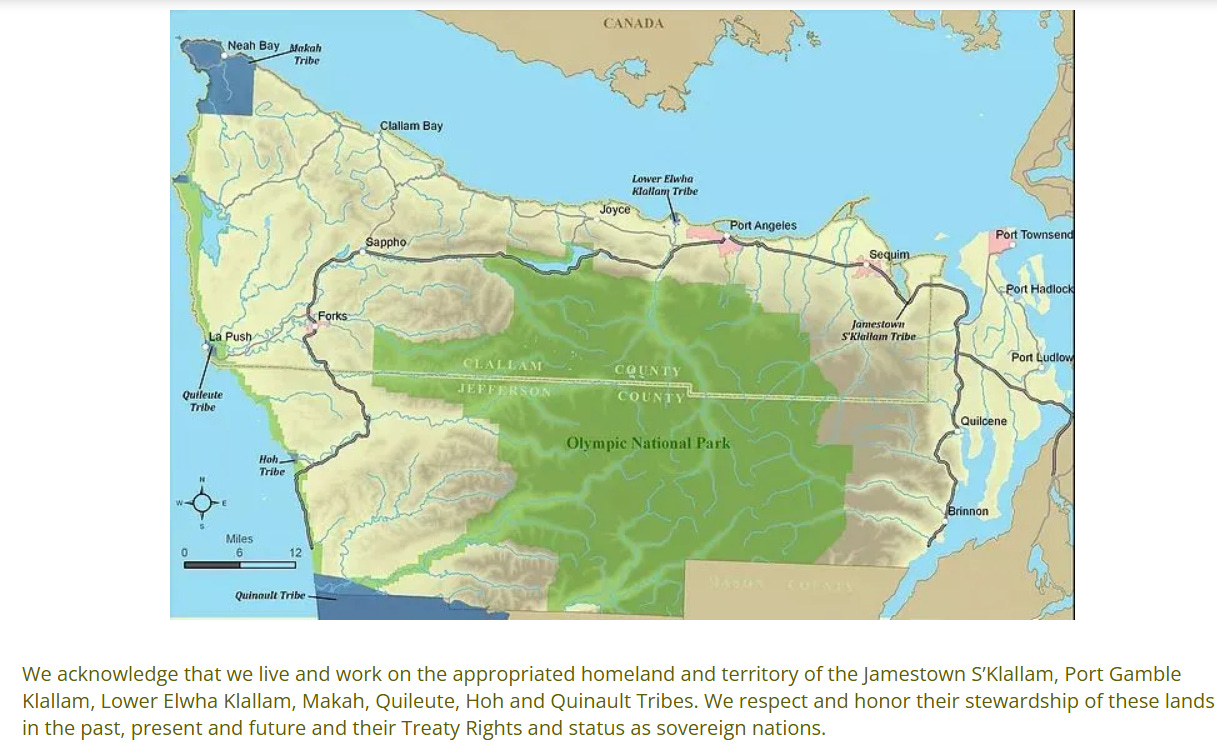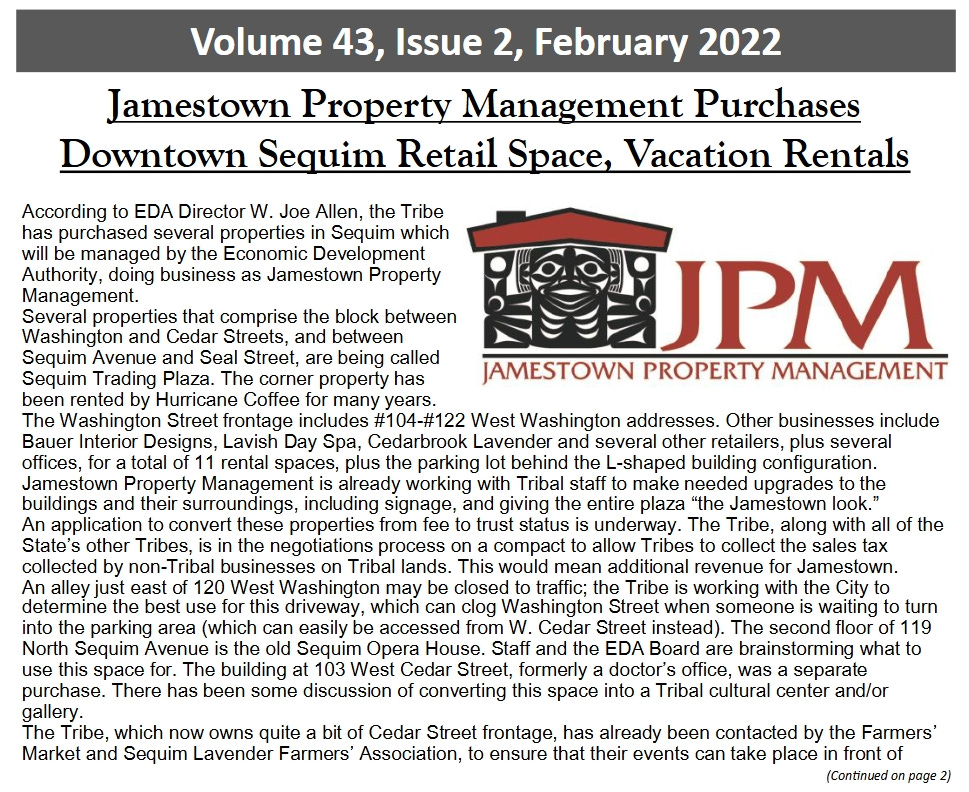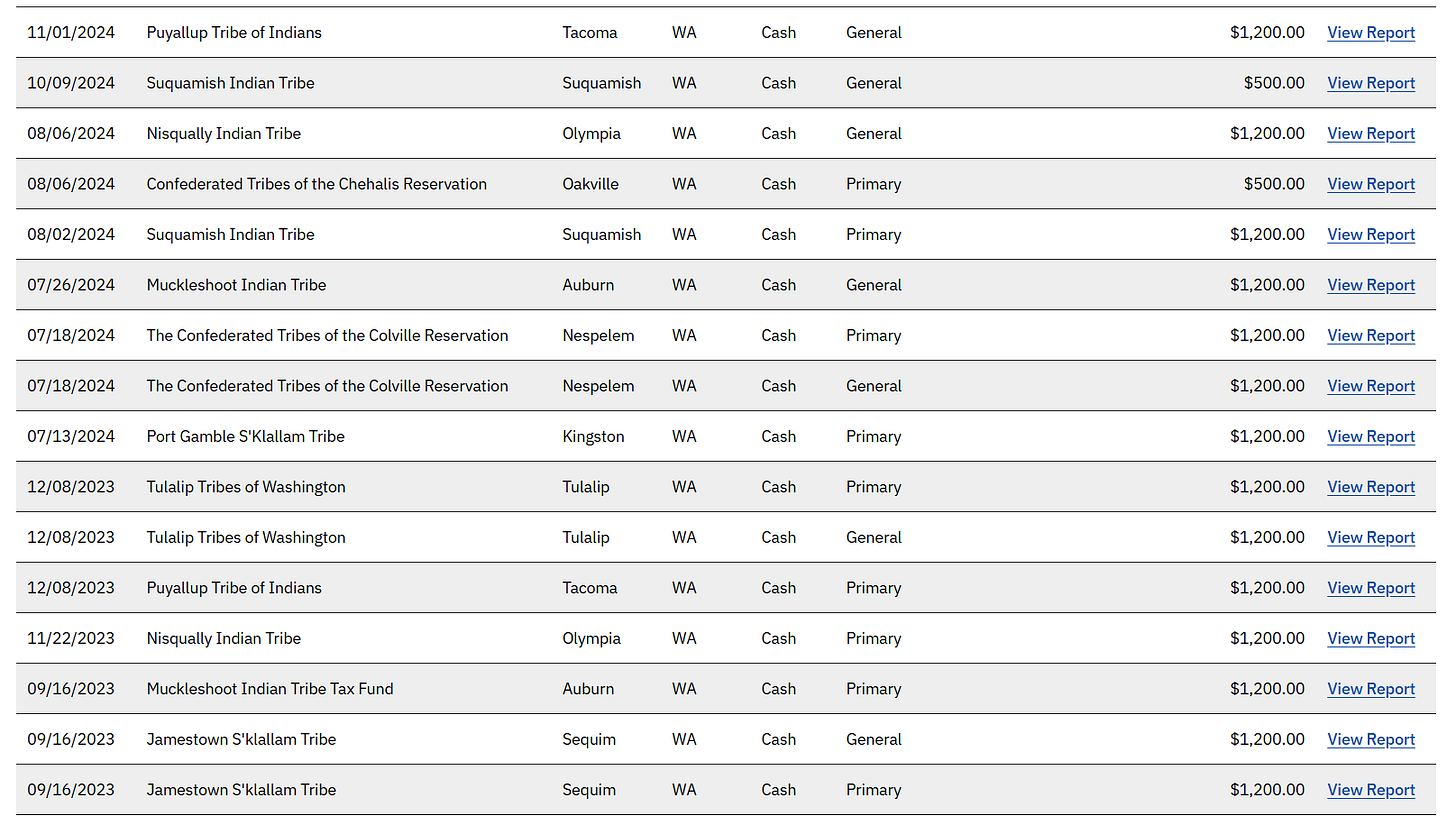Proposal would address shrinking tax base
County, Tribes navigate complex relationship
As more Clallam County land is converted to tax-exempt tribal trust status, one Charter Review Commissioner is pushing for a new requirement: a plan to evaluate and respond to these requests before local tax revenues and regulations vanish. With millions in tax dollars at stake and tribal-state compacts evolving, the debate over sovereignty, fairness, and fiscal responsibility is heating up—and voters may soon get a say.
Charter Review Commissioner and former Clallam County Commissioner Ron Richards is floating a proposal to amend the Clallam County Charter to address a growing fiscal concern: the removal of taxable land from the county's property rolls when it is converted to tribal trust or reservation status.
Under federal law, tribes can petition the Bureau of Indian Affairs (BIA) to place purchased land into trust. When such requests are approved, the land is exempted from county property taxes, and state and local environmental laws no longer apply. Over time this process has contributed to a shrinking tax base and weakened local oversight.
Currently, when a tribe submits a trust land request to the BIA, the agency invites the county to offer feedback—support, opposition, or proposed conditions. But Clallam County hasn’t responded in at least nine years. There are no standards, policies, or guidelines in the County Code directing officials on how to evaluate such requests or whether to respond at all. This silence is problematic.
To address the issue, Richards is proposing a charter amendment that would require the County’s Comprehensive Plan to include a dedicated section establishing criteria and procedures for responding to trust land requests. Specifically, the amendment would:
Require the County to develop clear standards or guidelines to evaluate whether such trust land conversions should be supported, opposed, or conditioned.
Mandate the County submit a formal response to the BIA on each request.
Provide a framework for assessing the cumulative impacts on local tax revenue, regulatory enforcement, and infrastructure planning.
Be our guest
Richards explained his idea at a public Charter Review Committee forum hosted by the Clallam County Democrats last month in Port Angeles. The event was a casual, open opportunity for residents to ask questions and learn more about proposed changes to the county’s foundational governing document.
During the event, Port Angeles City Councilmember Navarra Carr, who also serves as Secretary of the North Olympic Development Council (NODC), asked Richards how the proposal would be balanced with the presence of four sovereign tribal nations in Clallam County. Carr emphasized that many county residents are living on ancestral tribal lands and should consider themselves “guests.”

Richards acknowledged the importance of respecting tribal sovereignty but emphasized that, under existing treaties, most county residents are legal inhabitants—not guests. He pivoted back to the growing issue of a shrinking tax base, citing a tangible example: the Jamestown S’Klallam Tribe’s 2022 purchase of the Sequim Trading Plaza, which houses Hurricane Coffee Company and ten other businesses. Richards said an application to convert the property to trust status is underway, and negotiations are in progress to allow the Tribe to collect sales tax directly from non-tribal businesses operating on tribal land.
Port Angeles City Councilmember and Jamestown tribal member LaTrisha Ollom-Suggs, also in attendance, cautioned Richards against “spreading rumors,” saying there was no evidence the property would be formally placed into trust or that sales tax revenue would be affected. Richards then produced the February 2022 Jamestown newsletter which said: “an application to convert these properties from fee to trust is underway,” and “The Tribe, along with all of the State’s other Tribes, is in the negotiations process on a compact to allow Tribes to collect the sales tax collected by non-Tribal businesses on Tribal lands. This would mean additional revenue for Jamestown.”
Ollom-Suggs reminded attendees that many tax-exempt entities—such as churches and hospitals—also reduce the county’s tax base. That’s true, however, those institutions, unlike sovereign tribal land, remain subject to local zoning laws, environmental regulations, and law enforcement jurisdiction. They also pay many taxes and fees from which tribes are exempt.
Ollom-Suggs added that while tribes can retain 75% of the gas tax revenue collected at their stations, that money must be used for transportation purposes, citing bicycles as an example. After the forum, Clallam County Watchdog reached out to her for more detail. When asked how she confirmed how those funds were spent—given that audits are done by third parties, classified as “personal information,” and kept confidential by the state—she responded:
“Thank you for your email. You will need to reach out to the Tribes to ask questions specific to them. I represent the City as a council member and attending that was not associated with representing the city, it was my personal time.”
In January, CC Watchdog reached out to Wendy Clark-Getzin, the Jamestown Tribe’s Transportation Program Manager, requesting the past five years of audits detailing the allocation of remitted gas tax revenue for the Jamestown gas station. Clark-Getzin did not respond. Additionally, CC Watchdog contacted Councilmember Navarra Carr to inquire how she had determined that non-tribal residents were classified as “guests” in Clallam County. Carr also did not provide a reply.
Tax for us, revenue bump for tribes
The issue has new urgency as state lawmakers consider raising the gas tax. Representative Jake Fey, Chair of the House Transportation Committee, is pushing a 9-cent per gallon increase. For tribal gas stations like Jamestown’s Longhouse Market in Blyn or the Lower Elwha’s Food and Fuel, which may sell hundreds of thousands of gallons per month, the revenue implications are significant—millions in additional tax revenue could be directed to tribal governments annually.
What might Tribes do with that extra revenue—unaudited by the state and classified as "personal information"? A closer look at Representative Jake Fey’s campaign contributions could offer some insights.
One more Charter Review “Town Hall”
The Charter Review Commission’s final scheduled town hall is set for tonight, April 7, from 6–8 p.m. at the Crescent Grange in Joyce (50724 Highway 112, Port Angeles). Commissioner Jim Stoffer has indicated that the forum may allow for more open dialogue between commissioners and the public—making it a timely chance for residents to weigh in on the future of land use, tax fairness, and tribal-county relations in Clallam County.






Dear Clallam County Charter Commissioners
Amazing, After being warned this week collectively, you proceeded to take unfounded illegitimate action against a single Charter Commissioner rather than focus on your responsibility to query the voters of Clallam County about what actions they believe might improve the Clallam County Charter, review them in your individual districts to determine what suggestions might be appropriate to bring to the overall electorate, then vote on them collectively (all three districts), and then bring the ones you collectively believe have merit to the public on the November 2025 ballot. You are not doing that at all, thus you are bound for failure without corrective action.
First, Commissioner James Stoffer has unilaterally determined that the electorate cannot hear from individual Charter Commissioners during the Town Hall meetings. They are not allowed an open dialogue with the attendees. Only Commissioner James Stoffer and his chosen confidants are allowed to speak to the attendees. Does that make sense to you?
Second, Because Chairwoman's Susan Fisch's girlfriend, School Board Member Patrice Johnson, did not want her public comments to be public, Chairwoman Fisch went off the deep end of the reasonability pool and violated the Civil Rights (legal protections that guarantee equal treatment and opportunities for all people. They apply to many aspects of life, including employment, housing, education, and voting. Civil and political rights are a class of rights that protect individuals' freedom from infringement by governments, social organizations, and private individuals. They ensure one's entitlement to participate in the civil and political life of society and the state) of a single Charter Commissioner.
Third, Chairwoman's Fisch and School Board Member Patrice Johnson went on to violate the First Amendment protections of the United States Constitution of a single Clallam County Charter Commissioner on Thursday night in a mind-numbing childlike tantrum personally designed to retaliate against an individual over an issue that is not appropriate for the Charter Commission to consider for personal reasons and without a lick of Emotional Intelligence [EQ]. (The First Amendment of the United States Constitution protects freedom of speech, religion, press, and assembly, It also protects the right to petition the government). Chairwoman Fisch and School Board Member Patrice Johnson violated the First Amendment rights of a single Charter Commissioner with multiple violations: "Freedom of speech", "Freedom of press", and the "Right to petition the government."
Fourth, Chairwoman Fisch abandoned rewriting the bylaws to mandate that Charter Review Commissioners must always state they are speaking solely for themselves, and not on behalf of the entire Charter Review Commission once it was pointed out that she and Commissioner James Stoffer had violated that very protocol last week
This is what your Chairwoman Fisch is doing today under the authority of the Clallam County Charter Review Board along with the assistance of Commissioner James Stoffer instead of performing the work and the duties for which they were charged by the electorate. If you, as the collective of the Charter Commissioners, do not end this madness you are putting my tax money and all taxpayers' money at risk to Civil Rights and First Amendment actions. You futher risk the failure to complete your work and you risk the dissolution of the Charter Board for gross negligence.
None of the outlandish behavior of elected officials listed above is within the Charter of the Charter Commission or the Charter Commissioners. I urge you to protect all of Clallam County from further financial disaster by ceasing this sideshow or dissolving the Charter Commission immediately.
Thomas Ash
The obviousness: OUR REAL ESTATE TAXES will continue to SPIKE.
Our Kommissars, Ozias, and company, will simply vote to bring us to our knees and laugh.